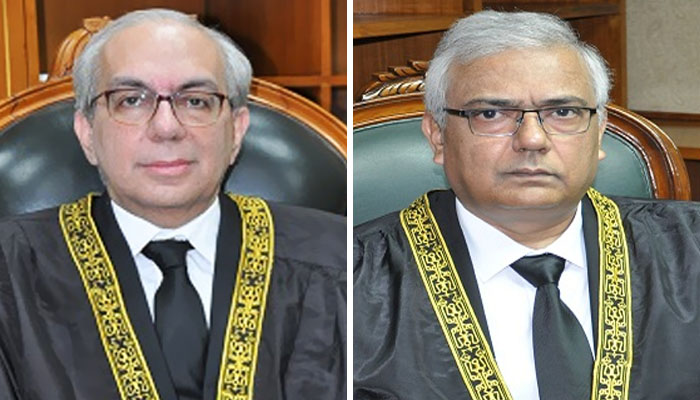CJP Isa replaces Justice Munib with Justice Amin in SC judges' committee
Development comes after President Zardari approves SC (Practice and Procedure) Amendment Ordinance
ISLAMABAD: Chief Justice of Pakistan (CJP) Qazi Faez Isa on Friday replaced Justice Munib Akhtar with Justice Amin-Ud-Din Khan in the judges' committee while exercising his powers under the Supreme Court (Practice and Procedure) Amendment Ordinance 2024 approved by President Asif Ali Zardari earlier today.
The changes have been made to the three-member judges committee of the apex court which decides on the formation of the SC benches and cases related to human rights.
The newly amended law grants additional powers to the chief justice to nominate a judge as a member of a committee, if a member of the committee is absent, as per The News. The ordinance also gave the CJP authority to assign cases.
A notification was also issued by the top court's registrar office in this regard which stated that the senior puisne judge — Justice Mansoor Ali Shah — was also among members of the three-member committee.
A session of the judges' committee is expected to be summoned on Monday, sources privy to the development told Geo News.
The ordinance also includes an amendment in Section 3 of the Act.
What is Supreme Court (Practice and Procedure) Act 2023?
The Pakistan Democratic Movement (PDM) passed the Supreme Court (Practice and Procedure) Act 2023, during the last days of its government to regulate the chief justice's powers.
But they met a setback as even before the law was enacted on April 21, 2023, an eight-member bench constituted by then-CJP Umar Ata Bandial issued a stay order on it on April 13, 2023.
The law gave the power of taking sou motu notice to a three-member committee comprising senior judges including the chief justice. It further aimed to have transparent proceedings in the apex court and includes the right to appeal.
Regarding the constitution of benches, the law stated that every cause, matter or appeal before the apex court would be heard and disposed of by a bench constituted by a committee comprising the CJP and the two senior-most judges.
It added that the decisions of the committee would be taken by a majority.
Regarding exercising the apex court's original jurisdiction, the Act stated that any matter invoking the use of Article 184(3) would first be placed before the committee.
On matters where the interpretation of the Constitution is required, the Act stated the committee would compose a bench comprising no less than five apex court judges.
About appeals for any verdict by an apex court bench that exercised Article 184(3)'s jurisdiction, the Act said that the appeal would lie within 30 days of the bench's order to a larger SC bench. It added that the appeal would be fixed for hearing within a period not exceeding 14 days.
The Act additionally said that a party would have the right to appoint its counsel of choice for filing a review application under Article 188 of the Constitution.
Furthermore, it stated that an application pleading urgency or seeking interim relief, filed in a cause, appeal, or matter, shall be fixed for hearing within 14 days from the date of its filing.
However, the law had the provision that this right of appeal would also extend retrospectively to those aggrieved persons against whom an order was made under Article 184(3) prior to the commencement of the Act, but the court has struck it down
-
Security forces gun down 30 terrorists in multiple IBOs in KP: ISPR
-
MQM-P calls for new province in Sindh
-
US report validates Pakistan military edge over India: PM
-
Banned TTP poses serious threat to Pakistan security: UNSC panel
-
CM Afridi clarifies remarks on by-poll after ECP requests army deployment
-
Dubai sees 3.2m Pakistani passengers in 2025 as airport sets new milestone
-
Security forces kill 23 Indian proxy terrorists in KP's Kurram
-
Pakistan to construct island to boost oil exploration: report












